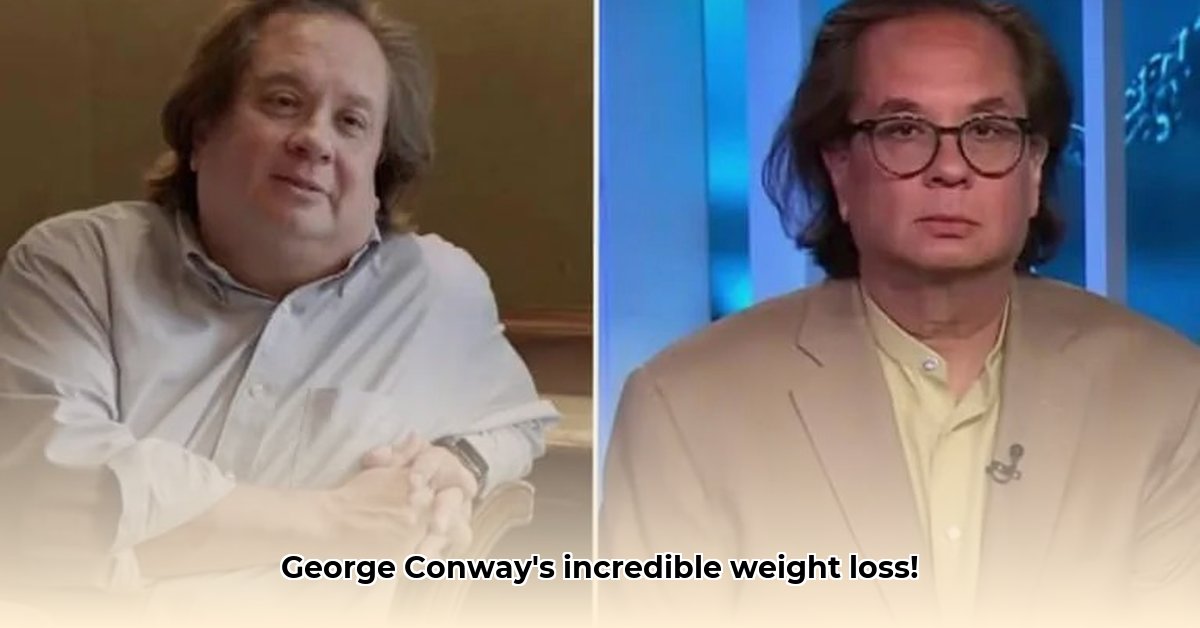
George Conway's Weight Loss Journey: A Comprehensive Overview
George Conway's remarkable weight loss journey, reportedly resulting in a 100-115 pound loss over two to three years, provides an inspiring example of dedication to a healthier lifestyle. While specific details aren't publicly available, analyzing available information reveals a multifaceted approach likely contributing to his success.
The Pillars of Conway's Transformation: Diet and Exercise
Conway's achievement wasn't a result of fad diets, but rather a consistent commitment to a balanced approach encompassing diet and exercise. His diet likely emphasized high-protein, low-carbohydrate foods, minimizing processed food intake. This dietary strategy, coupled with a rigorous exercise routine, likely formed the cornerstone of his success.
Reports suggest a consistent six-day-a-week regimen incorporating both weight training and cardio. This combined approach—building muscle mass while burning calories—is a highly effective strategy for long-term weight management. While unconfirmed, the structure and intensity suggest potential professional guidance, highlighting the benefit of personalized plans. The long-term commitment itself speaks volumes about his dedication.
Did Conway's approach require significant discipline? Absolutely. But the resulting health benefits likely made the effort worthwhile. This highlights the importance of a sustainable, long-term commitment.
Intermittent Fasting: A Potential Contributing Factor
Another potential element of Conway's strategy might have been intermittent fasting. This involves cycling between periods of eating and fasting, such as the popular 16/8 method (fasting for 16 hours, eating within an 8-hour window). While potentially effective for some, it's crucial to note that intermittent fasting isn't suitable for everyone and should only be undertaken after consulting a physician. Individual health conditions must be considered before adopting this method. Therefore, while potentially contributing, it's not the sole factor behind his success.
What's the key takeaway regarding intermittent fasting and Conway's weight loss? It's one possible component of a broader strategy, not a magic bullet. Always consult a professional before making significant dietary changes.
The Mental Game: Willpower and Support
Beyond the physical aspects, Conway's journey undoubtedly involved significant mental strength. Sustaining such a transformative change requires considerable willpower and resilience. This underscores the importance of mental fortitude in achieving and maintaining long-term weight loss. A strong support network – friends, family, or even a therapist – likely provided vital encouragement and accountability during challenging periods. This is often an overlooked aspect, but a vital one.
How did mental strength contribute? It's widely accepted that weight loss is as much a mental challenge as a physical one. Conway's success highlights the need for a holistic approach, incorporating mental well-being.
The Rewards: Improved Health and Well-being
Conway's transformation yielded substantial health benefits beyond weight loss. He likely experienced improvements in various health markers, such as reduced pain, improved cholesterol levels, and potentially lower blood pressure. These improvements underscore the powerful connection between weight management and overall well-being. Weight loss is not just about appearance; it's about improving quality of life.
What's the crucial lesson here? Sustained weight loss contributes significantly to improved physical and mental health, extending beyond the scale.
A Step-by-Step Guide to Your Weight Loss Journey
While Conway's experience is inspiring, it's vital to remember that every individual's journey is unique. This table outlines a general framework for approaching your weight loss goals:
| Stakeholder Group | Short-Term Goals (0-1 Year) | Long-Term Goals (3-5 Years) |
|---|---|---|
| Individuals | Consult your doctor; set realistic goals; gradually incorporate healthier choices into your diet and exercise routine. | Maintain a balanced, sustainable lifestyle; prioritize mental well-being; consistently monitor and adjust your approach as needed. |
| Healthcare Professionals | Educate patients on sustainable strategies; comprehensive support, addressing physical and mental health. | Advocate for policies supporting healthy lifestyles; research best practices for weight management. |
Remember, always consult your doctor or a registered dietitian before making significant changes to your diet or exercise routine. They can help create a personalized plan aligned with your individual needs and health status. Prioritize long-term sustainability and celebrate your progress along the way. Your journey is a marathon, not a sprint.